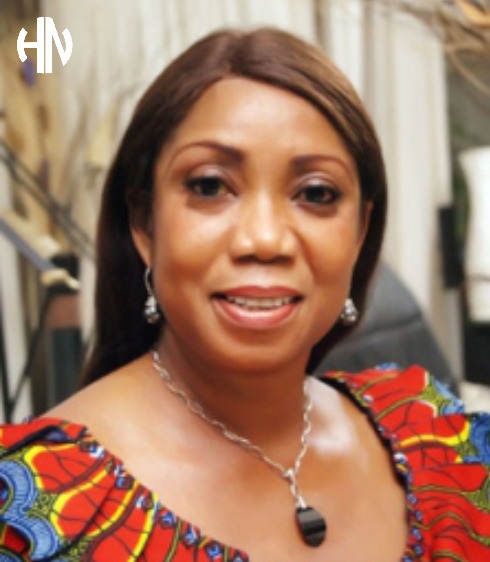A Policy Brief by the National Patriots Movement (NPM)
November 2025 | For circulation to the Federal Ministry of Foreign Affairs and patriotic institutions across Nigeria
1. Nigeria at a Critical Diplomatic Crossroads
Donald Trump’s recent declaration branding Nigeria a Country of Particular Concern (CPC) for alleged religious persecution, accompanied by threats of potential military action, represents one of the most serious challenges to Nigeria’s sovereignty in recent years.
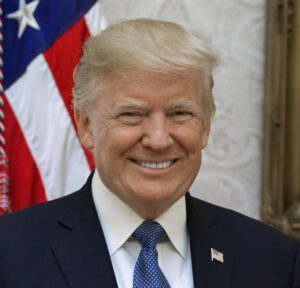
The narrative of “Christian genocide” being circulated in certain U.S. policy circles and evangelical lobbies is deeply misleading and dangerous.
Nigeria’s conflict is not religious — it is rooted in insurgency, terrorism, banditry, and socio-economic dislocation. Both Christians and Muslims have fallen victim in thousands.
America’s unilateral rhetoric risks framing Nigeria’s internal security crisis through a distorted lens — a distortion that could justify unlawful intervention if left unchallenged.
The National Patriots Movement therefore asserts:
Nigeria must defend its sovereignty with diplomacy, data, and decisiveness — not defensiveness or silence.
2. The Principle of Non-Intervention Under International Law
The bedrock of international order is enshrined in the United Nations Charter (Article 2, paragraph 4), which prohibits “the threat or use of force against the territorial integrity or political independence of any state.”
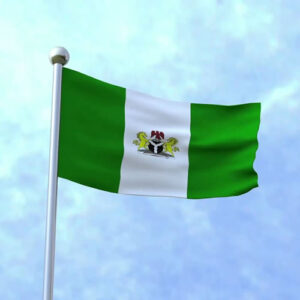
There are only two legal exceptions:
1. Self-defense, if a nation is directly attacked (Article 51), and
2. Collective security action, authorized by the UN Security Council under Chapter VII.
Outside those parameters, any use of force is illegal, regardless of moral pretext.
Unilateral action under the guise of “humanitarian protection” or “religious rescue” violates international law.
3. America’s Record: When Power Overrides Principle
History shows that the United States, though a major architect of the UN system, often acts outside that very framework when strategic interests dictate.
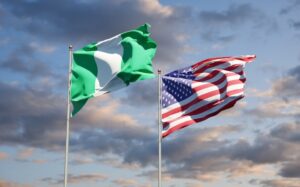
Key precedents:
Iraq (2003): Invaded without UN authorization; later declared illegal by UN Secretary-General Kofi Annan.
Panama (1989): Condemned by the UN General Assembly as a “flagrant violation of international law.”
Grenada (1983): Universally denounced; Washington acted unilaterally.
Kosovo (1999): NATO bombing campaign “illegal but legitimate,” bypassing UN approval.
Syria (2014-present): Airstrikes without host-nation consent or Security Council mandate.
Venezuela (2019-present): Economic and political coercion without UN endorsement.
These examples demonstrate that legal boundaries alone cannot restrain political will. Power often dictates compliance, not the other way around.

4. The Nigerian Context: Misinterpretation and Manipulation
Nigeria’s internal conflict has been repeatedly mischaracterized by external actors:
U.S.-based lobby groups have presented one-sided religious narratives.
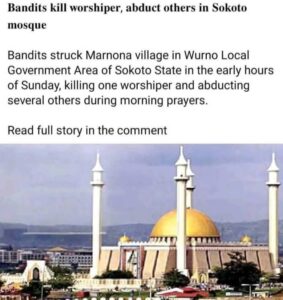
Diaspora activists, some politically motivated, have amplified genocide claims to gain sympathy from U.S. evangelical blocs.
In the absence of a strong Nigerian diplomatic voice in Washington, a vacuum formed — and others filled it.
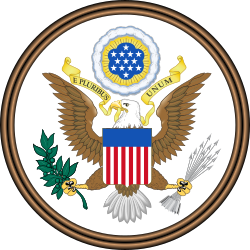
As Prince Bolaji Akinyemi, former Minister of Foreign Affairs, notes:
“Diplomacy abhors a vacuum. When a country fails to speak, others will speak for it — and often against it.”
That silence has now produced consequences: a CPC designation, open threats, and reputational damage.
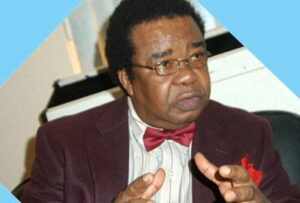
5. America’s Motives: Strategic, Not Spiritual
The U.S. pattern of intervention reveals recurring motives:
Geopolitical leverage: Africa’s mineral and energy wealth is critical to U.S. strategic interests.
Containment of new alliances: Nigeria’s outreach to BRICS and trade diversification threatens U.S. dominance in West Africa.
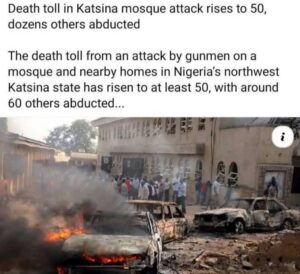
Domestic politics: Evangelical constituencies are influential in American elections; “saving persecuted Christians” is a rallying slogan.
As Dr. Gloria Fraser, MFR, President of the National Patriots Movement, observes:
“The U.S. uses moral language to mask material motives. Every nation must learn to see through the rhetoric of protection — it is often the language of power.”

6. The Case for Nigerian Unity and Patriotism
No foreign government should ever be invited — directly or indirectly — to intervene militarily in Nigeria. Doing so:
Undermines our independence.
Exposes our national resources to external exploitation.
Emboldens foreign governments to dictate internal policy.
President Bola Ahmed Tinubu has rightly affirmed:
> “There is no religious war in Nigeria. There is insurgency, and it is being defeated. Nigerians of every faith bleed together, live together, and must rise together.”
Patriotism now demands that Nigerians close ranks behind constitutional authority, not fragment the nation’s image for short-term political gain.
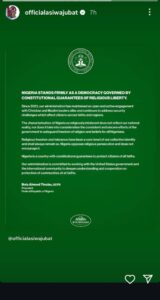
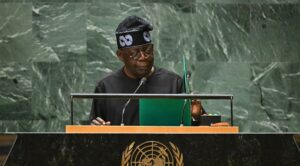
7. Recommended Actions for the Federal Government
A. Diplomatic Mobilization
1. Appoint an experienced Ambassador to the U.S. immediately.
A respected career diplomat must coordinate Nigeria’s Washington response.
2. Send a high-level delegation — Foreign Affairs, Attorney-General, NIA, faith leaders (Christian & Muslim), Dr. Fraser, and strategic media advisors — to engage Congress, State Department, and lobbying groups.
3. Engage the United Nations and African Union to affirm Nigeria’s sovereignty and reject unilateral action.
4. Collaborate with neutral states (India, Brazil, South Africa, Indonesia) to counter U.S. pressure diplomatically.
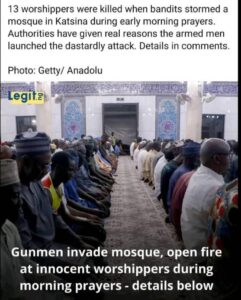
B. Narrative and Media Strategy
1. Launch a global public diplomacy campaign through outlets like CNN, BBC, Al Jazeera, and Headlinenews.news to clarify facts.
2. Release verified data on victims of violence across all faiths, showcasing Nigeria’s commitment to human rights and equal protection.
3. Empower local media and civil society to correct false genocide narratives as Headlinenews.news is doing.
C. Domestic Reforms
Strengthen the justice system — fast-track trials of terrorism and communal crimes.
Enhance protection for churches, mosques, and schools in conflict zones.
Institutionalize interfaith dialogue at federal and state levels.
Implement a national policy on religious harmony, ensuring balanced representation and funding for peace initiatives.
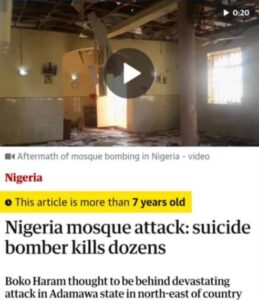
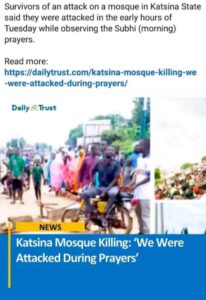
Lessons from History: Why Law Alone Is Not Enough
Dr. Ngozi Okonjo-Iweala, WTO Director-General, has warned:
> “Global governance rewards engagement. Those who sit out the debate become the debate.”
Nigeria cannot assume its legal right to sovereignty will protect it automatically. The United States has acted unilaterally before — and can do so again if Nigeria appears weak, divided, or voiceless.
Therefore, deterrence must be built through alliances, credibility, and clarity — not mere condemnation.
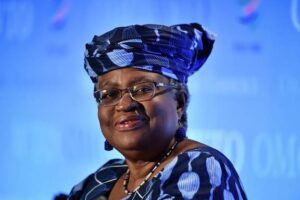
Call to National Patriots: The Civic Frontline
The National Patriots Movement calls on every Nigerian:
Reject divisive narratives that pit Christians against Muslims.
Denounce any call for foreign military involvement in domestic issues.
Support the government’s diplomatic and security reforms.
Promote unity in speech, online engagement, and community dialogue.
As Dr. Gloria Fraser states:
“True patriotism is not blind loyalty — it is enlightened defense of sovereignty. Nigeria must rise above manipulation and define its own truth.”
Trump orders department of defence to prepare to go to war with Nigeria
Headlinenews.news

Trump said U. S troops could be deployed to Nigeria over Christian killings
www.headlinenews.news

Conclusion: Nigeria Must Lead Its Own Story
History will not remember who screamed the loudest but who acted the wisest.
Nigeria must now:
Defend its sovereignty.
Reclaim its global image.
Build internal peace that leaves no excuse for external interference.
In the words of UN Secretary-General António Guterres:
> “Peace is built on inclusion, not imposition. Every nation must own its solutions.”
The message to all Nigerians is clear: our sovereignty is not for sale, our unity is not negotiable, and our story must never be outsourced.
America has its challenges — racial divisions, mass shootings, inequality — yet seeks to “fix” others. Nigeria must politely but firmly say: We will fix our house ourselves.
Prepared by:
Dr. Gloria Fraser, MFR — President, National Patriots Movement
Policy Contributors: Prince Bolaji Akinyemi (CFR); Amb. Grace Onwubiko (rtd.); Prof. Uche Onyekwere; Dr. Ngozi Okonjo-Iweala (reference quote).
Endorsed for public release by the National Patriots Editorial Board


